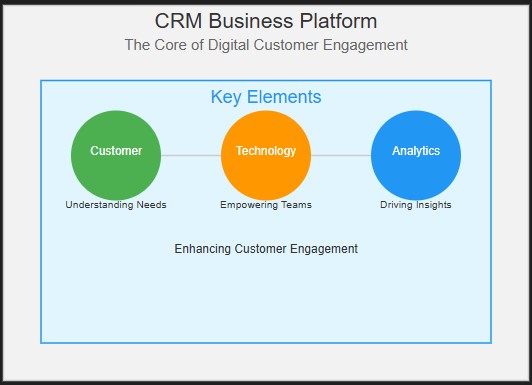In the age of hyper-digitalization, where customer loyalty is fragile and expectations are sky-high, companies need more than just traditional tools to manage relationships. They need CRM business platforms—comprehensive ecosystems designed not only to manage customers but to empower entire organizations to deliver personalized, real-time, and data-driven customer experiences.
Table of Contents
The Rise of CRM Business Platforms in a Digital-First Era
In the age of hyper-digitalization, where customer loyalty is fragile and expectations are sky-high, companies need more than just traditional tools to manage relationships. They need CRM business platforms—comprehensive ecosystems designed not only to manage customers but to empower entire organizations to deliver personalized, real-time, and data-driven customer experiences.
More than just contact management systems, CRM business platforms serve as the digital operating system for modern enterprises, integrating sales, marketing, service, commerce, and analytics into a unified interface.
This article explores the anatomy, importance, evolution, and real-world usage of CRM business platforms—shedding light on how they transform organizations into customer-centric powerhouses.
1. What Is a CRM Business Platform?
A CRM business platform is an integrated technological infrastructure that helps businesses manage, analyze, and improve customer interactions across the entire lifecycle. It goes far beyond managing names and phone numbers—it’s a centralized system that unifies customer data, team collaboration, marketing automation, sales funnels, support systems, and business analytics.
Key Characteristics:
-
Cloud-based and scalable
-
Open to integrations (APIs, plugins, third-party tools)
-
Modular in design (sales, service, marketing, commerce)
-
AI-powered for intelligent decision-making
-
Real-time analytics and dashboards
2. Evolution of CRM Platforms
Originally, CRM systems were local, clunky, and siloed. Early platforms like ACT! in the 1980s helped businesses manage contact lists. Fast-forward to the 2000s, the cloud revolution gave rise to Salesforce, the first major CRM-as-a-Service model.
Now in 2025, CRM platforms have evolved into AI-driven ecosystems. They don’t just manage relationships—they predict them. They don’t just store data—they leverage it for automated personalization, customer journey mapping, and ROI optimization.
3. Core Modules of a CRM Business Platform
A full-fledged CRM platform offers various interconnected modules, each designed to handle a unique part of the customer experience.
a. Sales Automation
-
Lead capture & scoring
-
Deal tracking & forecasting
-
Sales pipeline management
-
Mobile CRM for field agents
b. Marketing Automation
-
Email campaigns & triggers
-
Social media integration
-
Landing page & form builder
-
Journey orchestration
c. Customer Support/Service
-
Ticketing system
-
Live chat / chatbot integration
-
Knowledge base / self-service portals
-
Feedback collection
d. Commerce Enablement
-
Product catalog management
-
Integrated payment systems
-
Personalized upselling/cross-selling
e. Analytics & Reporting
-
Custom dashboards
-
Customer lifetime value (CLV) reports
-
Funnel analysis
-
Cohort and churn tracking
4. How CRM Platforms Drive Business Value
A CRM business platform acts as a value multiplier across departments:
| Department | Value Delivered |
|---|---|
| Sales | Shorter sales cycles, higher win rates |
| Marketing | Better segmentation, higher conversion rates |
| Customer Service | Faster resolution, better satisfaction |
| Finance | Improved forecasting and revenue predictability |
| IT | Centralized architecture, fewer tools to manage |
5. Popular CRM Business Platforms in 2025
Let’s look at some dominant players in today’s landscape:
1. Salesforce
The gold standard in enterprise CRM. Known for deep customization, integrations, and a vast app ecosystem (AppExchange).
2. HubSpot
Ideal for SMEs. Offers a freemium model and tight integration between marketing, sales, and service.
3. Zoho CRM
Cost-effective, all-in-one solution with strong automation and AI insights via Zia.
4. Microsoft Dynamics 365
Tightly integrates with Office suite and is a popular choice among enterprises for complex workflows.
5. Freshsales
Modern, intuitive, and includes built-in telephony, email, and marketing automation.
6. CRM Platform vs CRM Software: What’s the Difference?
| Feature | CRM Software | CRM Platform |
|---|---|---|
| Scope | Limited functionality | Modular and scalable |
| Integration | Few integrations | Open ecosystem (APIs) |
| Scalability | Difficult to scale | Designed to grow with business |
| Automation | Basic workflows | End-to-end journey automation |
| AI/Analytics | Minimal | Predictive & prescriptive |
TL;DR: A CRM platform is a flexible, extensible engine while CRM software is often a single-purpose tool.
7. Benefits of Using a CRM Business Platform
✅ 360° Customer View: Access customer data in one place, from purchase history to service tickets.
✅ Faster Decision Making: Real-time dashboards and AI predictions guide strategy.
✅ Better Collaboration: Sales, marketing, and support can view and contribute to shared customer records.
✅ Increased Productivity: Automation reduces manual tasks by up to 60%.
✅ Data-Driven Culture: Embedded analytics encourage continuous improvement.
8. Key Features to Look for in a CRM Platform
When evaluating platforms, prioritize these core attributes:
-
Customizable pipelines and workflows
-
Mobile accessibility
-
Strong API support
-
GDPR and data security compliance
-
Omnichannel capabilities
-
AI & machine learning tools
-
User-friendly interface
9. Use Case Example: SaaS Company Adopting CRM Platform
Company: A mid-sized SaaS startup with 50 employees
Challenges: Disconnected tools, lost leads, poor support SLA
CRM Solution: Adopted HubSpot CRM platform
Results in 6 Months:
-
35% increase in lead conversion
-
40% reduction in support ticket resolution time
-
25% boost in email engagement
-
Centralized data access for all teams
10. Building Your CRM Tech Stack
A CRM platform can serve as the nucleus of your entire business stack. Here’s how it integrates:
CRM Business Platform Stack:
├── CRM Core (Salesforce/HubSpot)
├── Email Marketing (Mailchimp, SendGrid)
├── Live Chat (Intercom, Drift)
├── Helpdesk (Zendesk, Freshdesk)
├── Social Media Tools (Hootsuite, Buffer)
├── Data Analytics (Looker, Tableau)
├── Billing/Finance (Stripe, QuickBooks)
├── Integration Layer (Zapier, Make, Workato)
11. Future of CRM Business Platforms (2025–2030)
🔮 AI-First Interfaces
Expect platforms that can auto-write emails, detect churn risk, and advise optimal actions.
🔮 Voice CRM
Manage pipelines and dashboards via voice assistants (e.g., Alexa CRM integrations).
🔮 Composable CRMs
Build your CRM stack block-by-block like Lego, selecting only what you need.
🔮 Decentralized Customer Data
CRM on blockchain for transparency, traceability, and zero data tampering.
12. Challenges in CRM Platform Implementation
Implementing a CRM platform is a complex transformation. Common pitfalls include:
-
Poor user onboarding and training
-
Over-customization leading to system bloat
-
Underestimating data migration complexity
-
Choosing the wrong platform for business size
💡 Pro Tip: Start with a minimal viable CRM (MVC) and scale modularly.
Conclusion: The CRM Business Platform as a Strategic Powerhouse
CRM business platforms are not just tools—they are foundational systems that determine how efficiently and effectively a company can serve its customers.
By integrating people, processes, and technologies, a CRM platform acts as the command center of customer intelligence, offering real-time insight, proactive automation, and long-term relationship building.
Companies that prioritize CRM platform strategy in 2025 are already outperforming peers in retention, revenue, and reputation.
Your customers deserve more than spreadsheets. They deserve an experience. A CRM business platform delivers it.




